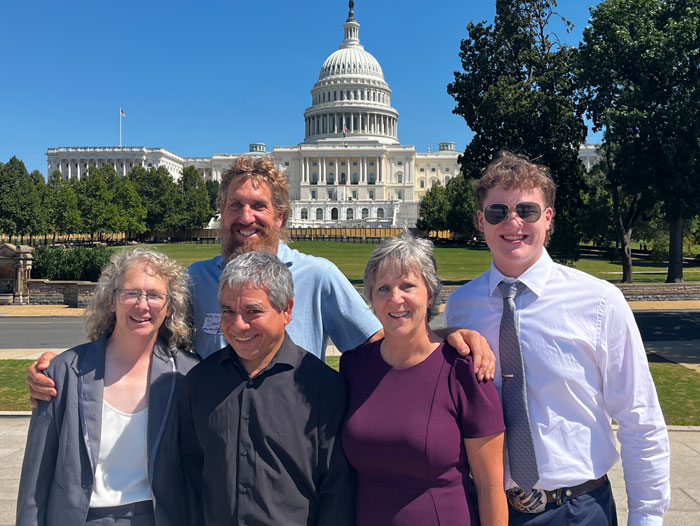Crate-Free Meat Companies & Hog Farmers Mobilize to Defend California’s Proposition 12 in Farm Bill Fight
September 16, 2024 | 4 min to read
A new coalition of pork industry leaders, including True Story Foods and Niman Ranch, gathered in Washington, D.C., to oppose the proposed EATS Act, which threatens to reverse California’s Proposition 12 and Massachusetts’ Question 3 on animal welfare. They emphasized that rolling back these laws would harm farmers and undermine public support for humane practices. Leaders like Ron Mardesen and Phil Gatto highlighted the economic risks to farmers who invested in compliance, expressing the need to protect consumer values surrounding animal welfare.

New Coalition Highlights Pork Industry Players in Support of the Crate-Free Law and the Economic Opportunity it Provides
Washington, D.C. — A new coalition of pork companies, retailers and hog farmers from across the country came together to host a Hill briefing in Washington, D.C. in support of animal welfare and to oppose the highly controversial proposed Ending Agricultural Trade Suppression (EATS) Act. In addition to the briefing, the coalition met with members of Congress to share more about the significant risks of the proposed EATS Act to farmers, businesses, voters and consumers.
If the EATS Act is included in the Farm Bill, it will reverse California’s Proposition 12 and Massachusetts’ Question 3, common-sense, democratically-adopted standards for farm animal welfare. Rolling back these laws will hurt farmers, businesses and consumers alike.
Key organizers of the coalition include crate-free pork companies True Story Foods and Niman Ranch along with direct-to-consumer meat brand ButcherBox. They were joined at the event by independent hog farmers, from small to large operations, from across the country. Served at the Congressional briefing were crate-free and Proposition 12 certified meats from Niman Ranch and True Story Foods for guests to enjoy.
Each company, brand and farm participating in the event believes in crate-free pork production and has found economic opportunity thanks to California’s Proposition 12 and the similar Massachusetts’s Question 3, two laws that require select pork products sold in the states be sourced from farms that provide pregnant pigs enough room to lay down and turn around. This first-of-its-kind coalition united to share an alternative perspective to the dominant narrative being perpetuated by the industrial pork sector and highlight how their businesses would be harmed if EATS were to move forward and roll back Prop 12 and Q3.
“As a farmer who has raised pigs without crates for my whole life, I’m frustrated that Congress could overturn something that was strongly supported by voters and affirmed by the Supreme Court,” said Ron Mardesen, an Iowa farmer who partners with Niman Ranch to sell his pigs. “It isn’t right for farmers, for animals or for the American consumer who is demanding stronger animal welfare practices that align with their values.”
If included in the Farm Bill, the EATS Act would overturn state laws that were broadly supported by voters, setting a dangerous precedent that could have far reaching impacts beyond pork production and agriculture. And, in addition to being a significant setback for animal welfare, it would also economically harm farmers who have invested in certification and updating their barns to become compliant with Proposition 12. “At True Story Foods, our farmers have invested millions to become compliant with Proposition 12, for our business and the state of California. The EATS Act threatens the livelihoods of our farmers and the future of our business by undermining the progress we’ve made. This isn’t just about upholding humane practices—it’s about protecting the investments and values that our farmers and consumers believe in,” said Phil Gatto, Co-Founder and CEO of True Story Foods.
This group of business and farming leaders using their voices in opposition to EATS has been growing over the last two years, including with an Amicus Brief from Niman Ranch that was cited in the Supreme Court’s final decision to affirm the California law and an industry open letter led by ButcherBox and endorsed by 24 companies sent to Congress earlier in the year. Signers of note include the event organizers as well as Whole Foods Market, Perdue Foods, Applegate, Thrive Market and Bon Appetit Management Company.
“We know, from our engaged customer base, how important animal welfare is to Americans,” said Mike Salguero, founder and CEO of ButcherBox. “There is a proven market for animals raised well as consumers become increasingly more aware of how their food is raised and sourced. This percentage of the population will only continue to grow. The EATS Act denies these customers the ability to have a say in the type of products they want to eat, especially those who have voted in favor of these welfare issues.”
